Duck Eggs vs Chicken Eggs | Discover Delicious Differences
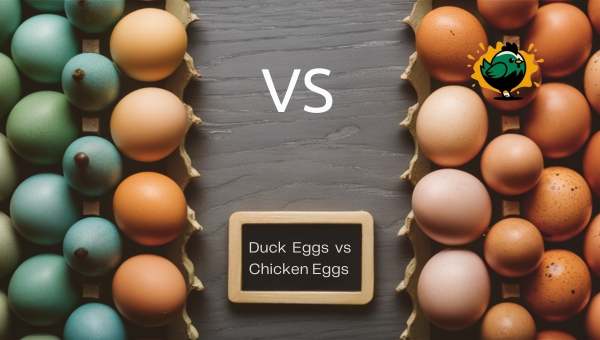
Imagine you’re at a bustling farmers’ market, surrounded by fresh produce. You stumble upon a stall featuring both duck eggs and chicken eggs. Curiosity piques your interest—what sets these eggs apart? As you ponder duck eggs vs chicken eggs, it’s fascinating to know that each type offers its unique benefits and flavors.
Whether you’re a culinary enthusiast or someone seeking nutritional advantages, understanding these differences can unlock a new world of culinary possibilities. Dive into this exploration with us, and let’s unravel the captivating distinctions between these two popular eggs.
Nutritional Differences Between Duck Eggs vs Chicken Eggs
When comparing duck eggs to chicken eggs, several nutritional differences become evident. These differences can play a pivotal role in dietary choices and preferences.
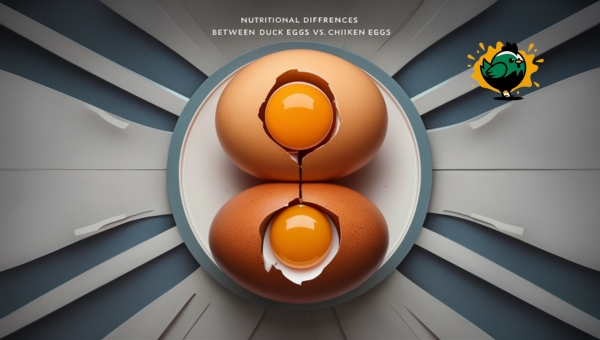
Let’s explore these distinctions, focusing on their size and caloric content, protein and fat content, as well as vitamin and mineral differences.
Size and Caloric Content
Duck eggs are known for their larger size and higher calorie content compared to chicken eggs. Here’s a closer look:
- Size: Duck eggs typically weigh around 70 grams, whereas chicken eggs weigh about 50 grams.
- Caloric Content:
- Duck egg: Approximately 130 calories
- Chicken egg: Approximately 72 calories
Protein and Fat Content
The protein and fat content in duck eggs also surpasses that of chicken eggs, providing a richer nutritional profile:
- Protein:
- Duck egg: 9 grams
- Chicken egg: 6.2 grams
- Fat:
- Duck egg: 9.7 grams
- Chicken egg: 5 grams
Vitamin and Mineral Differences
Duck eggs boast a greater concentration of certain vitamins and minerals, making them a nutrient-dense option:
- Vitamin A, E, K: Higher levels in duck eggs
- Iron: Duck eggs contain about 3.85 mg, while chicken eggs have around 1.75 mg
- Omega-3 Fatty Acids: More prevalent in duck eggs compared to chicken eggs
These nutritional variations can guide you in choosing the right egg type for your dietary needs.
Taste and Texture Comparison: Duck Eggs vs Chicken Eggs
When it comes to taste and texture, duck eggs and chicken eggs offer distinct experiences that can elevate your culinary creations. While chicken eggs have a familiar mildness, duck eggs bring a richer, more intense flavor to the table.
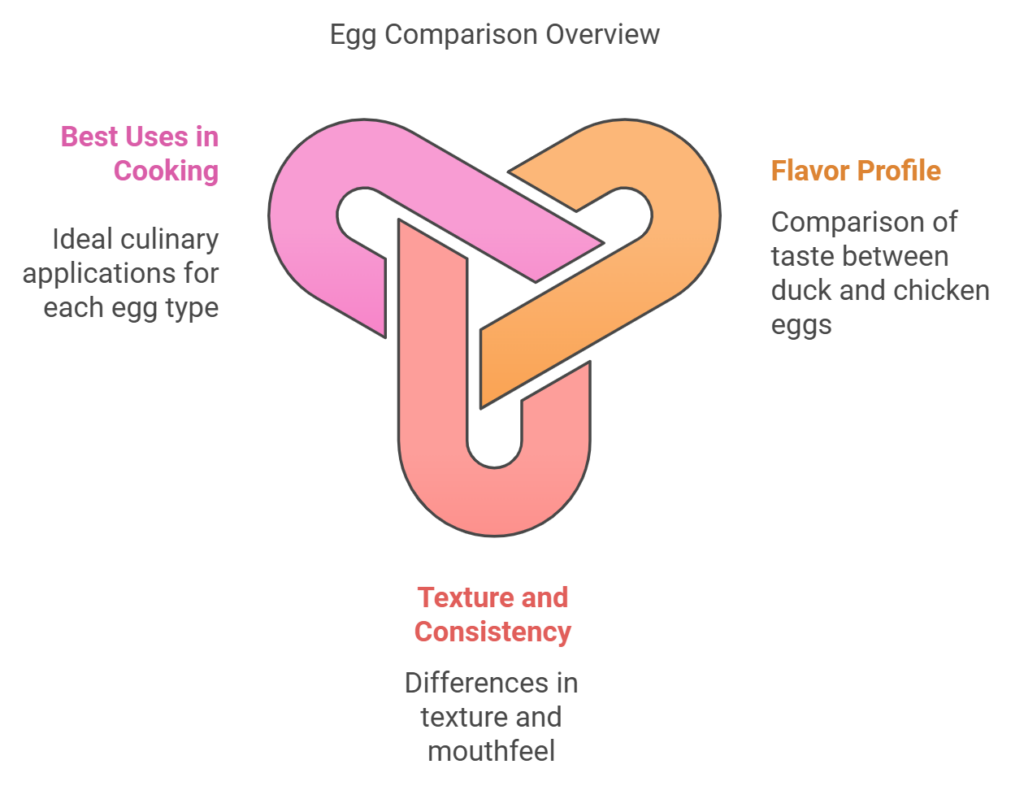
Their texture, too, sets them apart, as duck eggs tend to be creamier and have a unique consistency. Discover how these differences make each type of egg suitable for specific recipes and cooking techniques.
Flavor Profile
- Duck eggs offer a richer, more robust taste, often described as having an earthy flavor.
- Chicken eggs have a milder taste, which is more commonly found in everyday dishes.
- The yolk of duck eggs is usually more vibrant and flavorful compared to the subtler chicken egg yolk.
Texture and Consistency
- Duck eggs have a creamier texture, providing a velvety feel in dishes.
- The egg whites of duck eggs are generally thicker, leading to a different mouthfeel than chicken eggs.
- Chicken eggs have a lighter, more delicate texture, which many people find familiar and comforting.
Best Uses in Cooking
- Baking: Duck eggs are favored for their richer yolks, enhancing the texture and rise of baked goods.
- Frying: The robust flavor of duck eggs shines in fried dishes, offering a unique twist.
- Custards: The creamy texture of duck eggs makes them ideal for smooth, luxurious custards.
Also Read: Can Chickens Eat Eggshells? You Won’t Believe the Answer
Health Benefits of Duck Eggs vs Chicken Eggs
Exploring the health benefits of duck eggs compared to chicken eggs reveals intriguing possibilities for those mindful of their diet. These eggs not only differ in taste and texture but also offer unique nutritional advantages and potential health benefits.
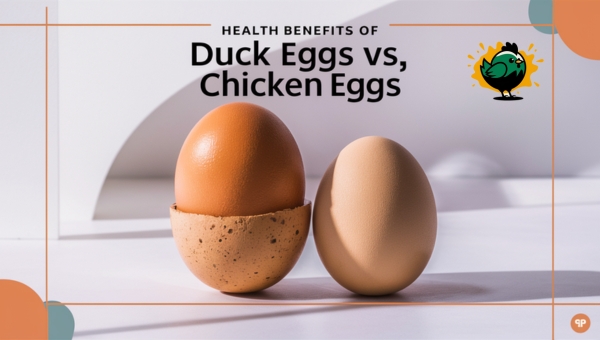
If you’re considering alternatives due to allergies, specific dietary needs, or immune support, understanding these differences can help you make an informed choice.
Allergy Considerations
For those with chicken egg allergies, duck eggs can be a potential alternative. While not everyone with such allergies will tolerate duck eggs, some people do find them suitable.
- Duck eggs may be tolerated by some chicken egg allergy sufferers.
- Always consult with a healthcare provider before trying duck eggs as an alternative.
- Testing for allergies is crucial before making the switch.
Benefits for Specific Diets
Duck eggs are particularly appealing to those following diets like keto or paleo. Their nutritional profile makes them a compelling option for these dietary plans.
- Higher in fat and protein, which aligns with keto and paleo requirements.
- Can provide additional energy due to increased caloric content.
- May enhance the richness and nutritional value of meals.
Immune-Boosting Properties
Duck eggs and chicken eggs both contain nutrients vital for immune support, but there are differences worth noting.
- Duck eggs tend to have more selenium, important for immune function.
- Richer in certain vitamins and minerals that support overall health.
- Considered beneficial for enhancing the body’s natural defenses.
Sustainability and Ethical Considerations
When it comes to choosing between duck eggs and chicken eggs, sustainability and ethics play a crucial role. Both farming practices impact the environment differently, with unique considerations for each.
Additionally, ethical egg production is important, focusing on humane treatment and free-range options. Let’s delve into these aspects to understand how they affect your egg choice.
Duck vs Chicken Farming
- Ducks typically require less land than chickens, as they can thrive in smaller spaces.
- Ducks often consume more water compared to chickens, which can impact water resources.
- The feed varies, with ducks sometimes needing a more diverse diet, affecting resource use.
Ethical Egg Production
- Free-range options are available for both ducks and chickens, but it’s important to check labels for verification.
- Ducks are generally more resilient to harsh conditions, which can affect how they’re raised.
- Humane treatment involves ensuring that both ducks and chickens have adequate space and access to the outdoors.
Availability and Cost of Duck Eggs vs Chicken Eggs
When choosing between duck eggs and chicken eggs, availability and cost are significant factors to consider. While chicken eggs are easy to find in most grocery stores, duck eggs can be more elusive and often come at a higher price. Let’s explore the cost differences, the best places to find duck eggs, and their seasonal availability.
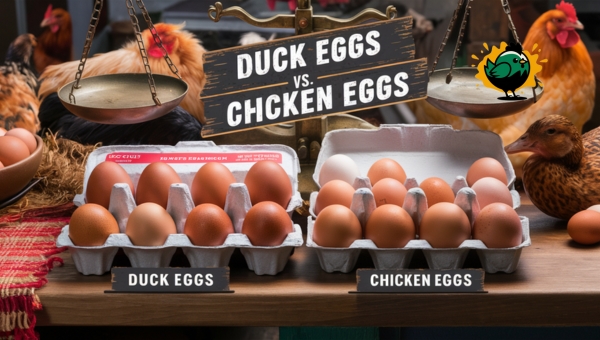
Price Comparison
When comparing the price of duck eggs vs chicken eggs, duck eggs generally cost more. This is largely due to their scarcity and the fact that fewer ducks are farmed compared to chickens.
Here’s a brief breakdown:
- Chicken eggs: Typically priced lower and found in a variety of sizes and quantities.
- Duck eggs: Usually more expensive, often seen in specialty or organic sections.
Where to Find Duck Eggs?
Finding duck eggs might require a bit more effort compared to chicken eggs. Here are some places to look:
- Farmers’ markets: A great place to find fresh duck eggs directly from local producers.
- Specialty stores: Shops that focus on organic or gourmet foods may carry duck eggs.
- Online: Some suppliers offer duck eggs through online marketplaces, providing delivery options.
Seasonal Availability
Duck egg production can be more seasonal compared to chicken eggs, which are available year-round. This is because ducks may lay fewer eggs during certain times of the year, affecting their availability in stores.
- Chicken eggs: Consistently available throughout the year.
- Duck eggs: Availability can fluctuate, with peak production typically in spring and early summer.
Also Read: Selling Eggs – Boost Your Profits Today
Cooking and Baking with Duck Eggs vs Chicken Eggs
When it comes to cooking and baking, the choice between duck eggs and chicken eggs can significantly impact the outcome.
Bakers often find duck eggs to be a game-changer due to their unique characteristics. From richer yolks to distinctive textures, understanding these differences can elevate your culinary creations.
Baking Advantages of Duck Eggs
Duck eggs are a baker’s secret weapon. Their yolks are richer and more vibrant, which contributes to a better texture and rise in baked goods.
This quality results in cakes that are fluffier and pastries with a more tender crumb. For those aiming to achieve that extra depth of flavor and superior consistency, duck eggs are often the preferred choice.
Cooking Differences
The cooking behavior of duck eggs compared to chicken eggs is notably different. Due to their larger size and unique texture, duck eggs require a bit more finesse in the kitchen.
For example, when making omelets or custards, duck eggs lend a creamier texture and may require slight adjustments in cooking techniques to achieve the perfect result.
Adapting Recipes
Switching from chicken eggs to duck eggs in recipes can be straightforward with a few adjustments:
- Adjust Quantity: Use fewer duck eggs if a recipe calls for multiple chicken eggs, as duck eggs are larger.
- Cooking Times: Expect longer cooking times for dishes like omelets due to the increased size and thickness.
- Flavor Enhancement: Duck eggs’ richer taste can enhance savory dishes, so consider reducing additional seasoning.
By adapting your recipes thoughtfully, you can enjoy the unique benefits that duck eggs bring to the table.
FAQs
Which is healthier: duck eggs or chicken eggs?
Both duck and chicken eggs offer nutritional benefits, but duck eggs have higher protein, fat, and certain vitamins like vitamin D. They may be a better choice for those seeking extra nutrition.
Why do duck eggs cost more than chicken eggs?
Duck eggs are generally more expensive due to limited production and availability. Ducks require more space and resources, which increases the cost of farming and, consequently, the price of the eggs.
Can I substitute duck eggs for chicken eggs in any recipe?
Yes, you can substitute duck eggs for chicken eggs in recipes, but keep in mind that duck eggs are larger. It may be necessary to adjust the quantity or cooking times for optimal results.
Are there any differences in cholesterol levels between duck eggs and chicken eggs?
Duck eggs typically contain more cholesterol than chicken eggs. Individuals concerned about cholesterol intake should consider this difference when choosing between the two.
Can people allergic to chicken eggs eat duck eggs?
Some people with chicken egg allergies can tolerate duck eggs, but it’s important to consult a healthcare professional before trying them as an alternative.
Conclusion
In examining duck eggs vs chicken eggs, it is evident that both offer unique benefits. Duck eggs are larger, richer in nutrients, and have a distinct taste, making them ideal for certain recipes.
Chicken eggs, on the other hand, are more widely available and cost-effective. When choosing between the two, consider dietary needs, cooking preferences, and budget. Both types of eggs can play a role in a balanced diet.
If you found this comparison helpful, explore more insightful articles on our site to enhance your understanding of various food choices and their benefits. Dive into our blog for more valuable information!
